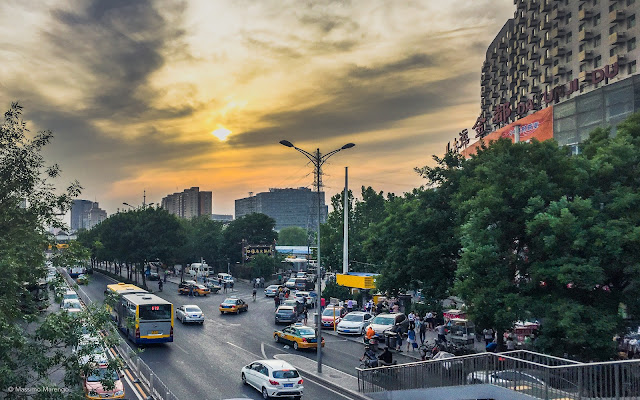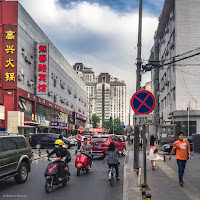 |
| Beijing street at sunset (May 27, 2016) |
When I was a kid, I was in awe of the globetrotting traveling life of my uncle. He spent all his vacations traveling to what for me were the most exotic destinations: India, the Canary Islands, the Galapagos, and of course China. Since these travels happened more than forty years ago, the China he visited was very different from the current one. It was a China of large avenues full of bicycles, and very few cars. It was a China where most people were wearing uniforms, and the cult of Mao was very strong. It was also a China that one could visit only in very controlled settings, with minders following at every single step, and deciding what you were allowed to see, and what not.
This is far from the China that I visited in 2016. The new China is a modern country with congested cities, a lot of cars, and a semi-perennial cloud of smog (although, in all fairness, I was very lucky during my trip and I got to see a lot of blue skies). Walking the busy streets of Beijing one has the feeling of being in any contemporary western city. You can still see the remnants of an epoch almost completely gone, like the old traditional neighborhoods that still border the walls of the Forbidden City, but that have been mostly razed and replaced by modern blocks of high rise apartments. The Beijing of 2016 looks very much like a city projected towards the future. Yet, one may question what this future will be. Talking with the expat community it seems clear that something has changed in recent years. Especially in the humanities, I heard people complaining of new restrictions in their academic activities that didn't exist a short while ago. Even the independent parties whose existence is allowed by the government seem to have a shorter leash than before. The country seem to be firmly on an authoritarian trajectory. (*) How much this will affect the economic boom and the technological and social explosion that China is currently experiencing, it remains to be seen.
(*) As I am revising these notes in December 2022, I can now fully appreciate how my expat sources were right in describing the authoritarian trajectory of the country, with a progressive concentration of power in the hands of a single person, and stronger restriction on the Chinese society that have existed for decades. As I am writing this footnote there are large protests even close to the center of power against the Covid-zero restrictions that the country has implemented in the futile effort to close its border to the virus that escaped from China itself two years before. Will these protests stop, once these restrictions are mitigated, or will the seed of protest expand to reclaim more aspects of the open society that have been lost in recent years?
 |
| Old and New in Beijing (May 27, 2016) |

No comments:
Post a Comment